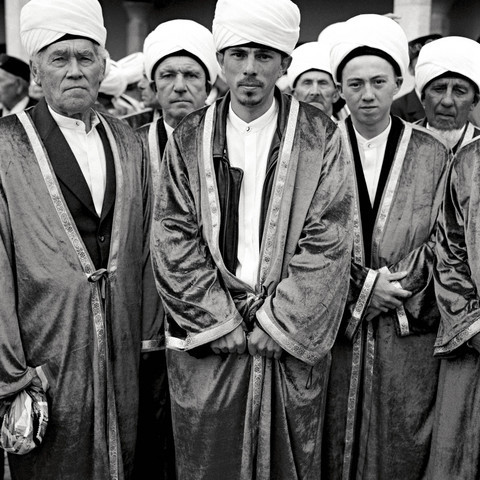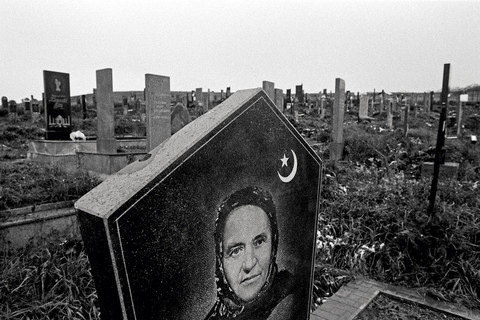Russia is a Slavic nation and historically an Orthodox Christian one. But it is also Islamic, and since the fall of the Soviet Union 14 years ago, Islam has grown increasingly visible and influential.
This is worrisome to some Slavic Russians, who fear not only Muslim extremists, but the possibility that Russia could one day become a majority Muslim state.
Still, if the threat -- and reality -- of conflict exists, it is also true that in many places, Muslim and Christian cultures are peacefully adapting to each other.

PHOTOS: NY TIMES
Islam spread into what became the Russian Empire in the 10th century -- 66 years ahead of Christianity, said Ravil Gainutdin, chairman of Russia's Council of Muftis. "Islam is a religion of native peoples in Russia and a traditional religion of this country," he said.
There are now an estimated 14 million to 23 million Muslims in Russia, as much as 16 percent of the population. They are in the majority in Russia's turbulent south, but more live quietly in places like Tatarstan and Bashkortostan on the Volga River, and in virtually every city.
Given the historic domination of the church, the czars and then

communism, Islam here has adopted an essentially Russian character. Believers pick and chose tenets of faith to follow, just as Orthodox Christians do. Even in predominantly Muslim cities, for example, alcohol flows abundantly.
"No one challenges me if I drink coffee during Ramadan," Murat Khokon, a physics professor at the University of Kabardino-Balkariya, a southern republic, said in an interview over an afternoon coffee during Ramadan. "It is between me and God. This is the culture we have here."
Even so, fundamentalism -- sometimes called "pure" Islam -- has made inroads among those who lacked access to the faith's teachings under communism.
The Kremlin, increasingly, has sought to control Islam, persecuting those who worship outside state-sanctioned "official" mosques. A crackdown in Nalchik, Kabardino-Balkariya's capital, closed six mosques and many Muslims were harassed. In October, at least 136 people died when armed men attacked police and security posts in what their relatives said was a revolt against official abuses.
"Russia," said Ali Pshigotyzhev, whose son was arrested following the fighting, "was not ready for the rebirth of Islam."
Could Russia be a model of relations between Islam and Christianity? That might seem an improbable question, given the tensions here. But in Kazan, the capital of Tatarstan, the two faiths have established a peaceful co-existence since the Soviet collapse.
In a sign of Islam's revival among the deeply traditional Tatars, the authorities recently opened the Kul Sharif Mosque inside the city's historic Kremlin. Its location is symbolic: It stands not far from the Annunciation Cathedral, which like the Kremlin itself, was built under Ivan the Terrible, the czar who conquered Tatarstan in 1552. It is named after the man who died resisting Ivan's troops.
It might not suggest a historic reconciliation, but the mosque represents Islam's place beside Christianity in today's Russia.
"Russian Muslims are people brought up on the culture of both Europe and Asia," Ravil Gainutdin, chairman of Russia's Council of Muftis, who is from Tatarstan, said. "And for the Muslims of our country, living side by side with Christians, Buddhists, Jews, is an experience that is centuries old."
An estimated 1 million Muslims live in Moscow, making it Europe's most Islamic city -- at least ethnically. Outwardly, though, the onion domes of Russian Orthodoxy dominate the cityscape. The Moscow Cathedral Mosque, the city's oldest, built in 1904, is a small building, literally in the shadow of the basketball arena built for the 1980 Olympics. The Council of Muftis has begun construction of a larger mosque next door, reflecting Islam's expansion in Russia. Islam's practices its prayers, its separation of men and women are universal, but the shoes are unmistakably Russian.
Islam's revival in the North Caucasus, on Russia's southern frontier, has been
accompanied by suspicion, conflict and, in Chechnya, war. In Cherkessk, capital of Karachayevo-Cherkessia, there is only one small mosque, built by believers in 1997. A billboard -- quoting the Prophet Muhammad, in Russian, raises funds for a new one. At the city's Islamic Institute, opened in 1993, 66 students learn the tenets of Islam, as well as Arabic, though under the scrutiny of the state, which remains suspicious of those who study Islam outside of state-sanctioned institutions.
At the Muslim cemetery in Nalchik, in neighboring Kabardino-Balkariya, etchings on headstones belie the influence of Russian culture; as Islam proscribes such imagery. The cemetery's newest graves include those killed in two days of fighting in October, provoked by government repression against devout Muslims.

On April 26, The Lancet published a letter from two doctors at Taichung-based China Medical University Hospital (CMUH) warning that “Taiwan’s Health Care System is on the Brink of Collapse.” The authors said that “Years of policy inaction and mismanagement of resources have led to the National Health Insurance system operating under unsustainable conditions.” The pushback was immediate. Errors in the paper were quickly identified and publicized, to discredit the authors (the hospital apologized). CNA reported that CMUH said the letter described Taiwan in 2021 as having 62 nurses per 10,000 people, when the correct number was 78 nurses per 10,000

As we live longer, our risk of cognitive impairment is increasing. How can we delay the onset of symptoms? Do we have to give up every indulgence or can small changes make a difference? We asked neurologists for tips on how to keep our brains healthy for life. TAKE CARE OF YOUR HEALTH “All of the sensible things that apply to bodily health apply to brain health,” says Suzanne O’Sullivan, a consultant in neurology at the National Hospital for Neurology and Neurosurgery in London, and the author of The Age of Diagnosis. “When you’re 20, you can get away with absolute

May 5 to May 11 What started out as friction between Taiwanese students at Taichung First High School and a Japanese head cook escalated dramatically over the first two weeks of May 1927. It began on April 30 when the cook’s wife knew that lotus starch used in that night’s dinner had rat feces in it, but failed to inform staff until the meal was already prepared. The students believed that her silence was intentional, and filed a complaint. The school’s Japanese administrators sided with the cook’s family, dismissing the students as troublemakers and clamping down on their freedoms — with

As Donald Trump’s executive order in March led to the shuttering of Voice of America (VOA) — the global broadcaster whose roots date back to the fight against Nazi propaganda — he quickly attracted support from figures not used to aligning themselves with any US administration. Trump had ordered the US Agency for Global Media, the federal agency that funds VOA and other groups promoting independent journalism overseas, to be “eliminated to the maximum extent consistent with applicable law.” The decision suddenly halted programming in 49 languages to more than 425 million people. In Moscow, Margarita Simonyan, the hardline editor-in-chief of the